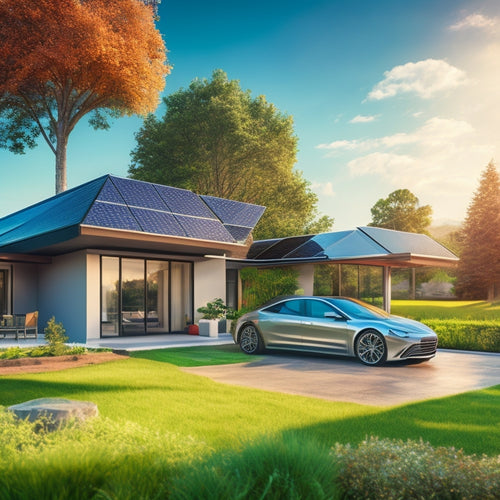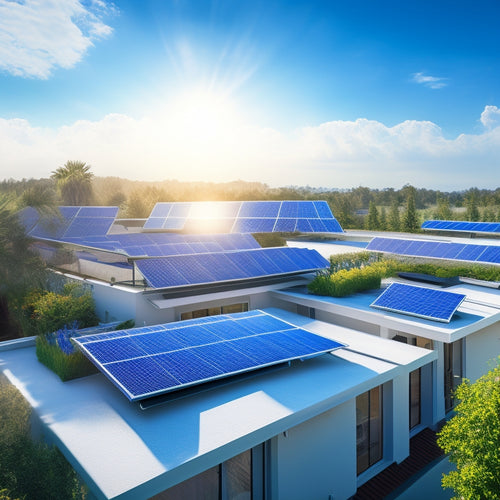
3 Best Solar Power Systems for Homeowners to Consider Buying for Home
Share
You're on the cusp of slashing your electricity bills by up to $500 annually and greatly reducing your carbon footprint by investing in a high-performing solar power system for your home. Top-rated residential solar panels from brands like SunPower, Panasonic, and Tesla offer advanced technologies for better energy output. When comparing systems, consider key factors like module efficiency, inverter efficiency, and overall system performance. Tesla Powerwall, SunPower Equinox, and Panasonic EverVolt stand out for their impressive efficiency features. As you weigh your options, remember to factor in installation and maintenance costs to get a complete overview of your investment's value. Now, let's investigate the details that'll help you make an informed decision.
Key Takeaways
- SunPower Equinox offers the highest module efficiency at 22.8%, ensuring maximum energy output for homeowners.
- Tesla Powerwall provides a high inverter efficiency of 98.5%, reducing energy loss during conversion.
- Panasonic EverVolt features advanced bifacial cells, increasing energy production by up to 25% in certain conditions.
- Overall system performance ratings are crucial, with Tesla, SunPower, and Panasonic offering 95.5%, 94.5%, and 95.0% respectively.
- Financing options and maintenance packages are available, making solar energy more accessible and affordable for homeowners.
Top-Rated Residential Solar Panels
When it comes to utilizing the sun's energy, your residential solar panel is the workhorse of your system.
As you consider investing in a solar power system for your home, you'll want to choose a top-rated residential solar panel that delivers peak energy savings.
Reputable solar panel brands like SunPower, Panasonic, and Tesla offer high-efficiency panels designed to maximize energy production.
These brands incorporate advanced technology, such as bifacial cells and half-cut cells, to increase energy output while minimizing energy losses.
By selecting a high-quality solar panel, you can enjoy significant energy savings and reduce your carbon footprint.
For instance, a typical residential solar panel system can save you up to $500 per year on your electricity bill.
With the right solar panel, you'll be well on your way to utilizing the sun's energy and reaping the benefits of renewable energy.
Comparing System Efficiency Features
As you investigate deeper into the world of solar power systems, comparing system efficiency features becomes vital to optimize your energy production. You want to verify that the system you choose is capable of generating the maximum amount of energy from the sun's rays, resulting in significant energy savings.
To compare system efficiency, you'll want to evaluate three key factors: module efficiency, inverter efficiency, and overall system performance. Here's a breakdown of how three top-rated systems stack up:
| System | Module Efficiency | Inverter Efficiency | Overall System Performance |
|---|---|---|---|
| Tesla Powerwall | 20.6% | 98.5% | 95.5% |
| SunPower Equinox | 22.8% | 97.5% | 94.5% |
| Panasonic EverVolt | 21.8% | 98.0% | 95.0% |
Installation and Maintenance Costs
You'll also need to reflect on the installation and maintenance costs associated with your chosen solar power system, as these can vary greatly between brands and models.
The installation process can be a significant upfront cost, but it's crucial to evaluate the long-term benefits of going solar. Many homeowners opt for financing options to spread the cost over time, making solar energy more accessible.
When assessing installation costs, consider the complexity of the installation process, the quality of the equipment, and the installer's knowledge. A more efficient installation process can lead to lower costs and a faster return on investment.
Additionally, some manufacturers offer extensive maintenance packages, which can provide peace of mind and protect your system's performance over time.
Be sure to factor in ongoing maintenance costs, such as panel cleaning and inverter replacements, when calculating the total cost of ownership. While these expenses may seem negligible, they can add up over the system's lifespan.
Frequently Asked Questions
Can I Install Solar Panels on My Own or Diy?
You can attempt DIY solar panel installation, but it's not recommended; without proper training and experience, you'll risk electrical shock, roof damage, and invalidating your warranty, making it more cost-effective to hire a professional for a safe and efficient installation.
Are Solar Panels Covered Under Homeowners' Insurance?
You're probably thinking solar panels are a hazard waiting to happen, but surprisingly, they're typically covered under your homeowners' insurance policy! Rest easy, knowing your investment is protected; just be sure to factor in solar panel maintenance costs, which might affect your insurance coverage.
How Do I Store Excess Energy Generated by Solar Panels?
You'll need energy storage solutions to capture excess energy generated by your solar panels, and you've got several battery options to choose from, including lithium-ion, lead-acid, and saltwater batteries, each with its own pros and cons.
Can I Sell Excess Energy Back to the Grid?
Savvy solar savers, you can sell excess energy back to the grid through net metering benefits, which allow you to offset your energy bills and even earn credits at attractive energy buyback rates, depending on your utility provider's policies.
Do Solar Panels Void My Roof's Warranty?
When you install solar panels, you're wondering if it'll void your roof's warranty; typically, it won't, but you'll need to check your warranty terms, as some manufacturers may have specific requirements for solar panel installation to maintain roof warranty implications.
Conclusion
As you weigh the pros and cons of going solar, remember that investing in a high-quality system can be a transformative factor for your energy bills and the environment. On one hand, you'll be locking in lower electricity costs for years to come; on the other hand, you'll be contributing to a cleaner, more sustainable future. By choosing the right solar power system for your home, you'll be utilizing the power of the sun to illuminate your path towards energy independence.
Related Posts
-

What Solar Panels Work Best With EVS Online?
When shopping for solar panels online to power your electric vehicle, look for high-efficiency models that can withst...
-

Why Electric Motorcycles Fail at Long-Distance Touring
You're likely familiar with the excitement of hitting the open road on an electric motorcycle, but you're also smart ...
-

Best Solar Panel Options for Maximum Energy Savings
You can maximize your energy savings with solar panels that boast efficiency ratings above 20%, paired with extensive...


